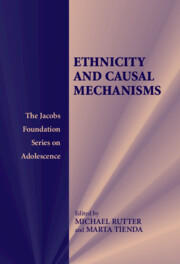Book contents
- Frontmatter
- Contents
- List of Contributors
- Foreword
- Preface
- 1 Natural Experiments, Causal Influences, and Policy Development
- 2 Growing Up Ethnic in the United Kingdom and the United States: Comparative Contexts for Youth Development
- 3 The Multiple Facets of Ethnicity
- 4 Educational Attainments: Ethnic Differences in the United Kingdom
- 5 Race and Ethnic Inequality in Educational Attainment in the United States
- 6 Racial and Ethnic Disparities in Crime and Delinquency in the United States
- 7 Explaining Ethnic Variations in Crime and Antisocial Behavior in the United Kingdom
- 8 Cultural Differences in the Effects of Physical Punishment
- 9 Ethnicity and Mental Health: The Example of Schizophrenia in the African-Caribbean Population in Europe
- 10 Ethnic Variations in Youth Suicide
- 11 Ethnicity and Intergenerational Identities and Adaptations in Britain: The Socio-Political Context
- 12 Assimilation, Dissimilation, and Ethnic Identities: The Experience of Children of Immigrants in the United States
- 13 Deciphering Ethnicity: Reflections on Research Opportunities
- Author Index
- Subject Index
1 - Natural Experiments, Causal Influences, and Policy Development
Published online by Cambridge University Press: 05 July 2014
- Frontmatter
- Contents
- List of Contributors
- Foreword
- Preface
- 1 Natural Experiments, Causal Influences, and Policy Development
- 2 Growing Up Ethnic in the United Kingdom and the United States: Comparative Contexts for Youth Development
- 3 The Multiple Facets of Ethnicity
- 4 Educational Attainments: Ethnic Differences in the United Kingdom
- 5 Race and Ethnic Inequality in Educational Attainment in the United States
- 6 Racial and Ethnic Disparities in Crime and Delinquency in the United States
- 7 Explaining Ethnic Variations in Crime and Antisocial Behavior in the United Kingdom
- 8 Cultural Differences in the Effects of Physical Punishment
- 9 Ethnicity and Mental Health: The Example of Schizophrenia in the African-Caribbean Population in Europe
- 10 Ethnic Variations in Youth Suicide
- 11 Ethnicity and Intergenerational Identities and Adaptations in Britain: The Socio-Political Context
- 12 Assimilation, Dissimilation, and Ethnic Identities: The Experience of Children of Immigrants in the United States
- 13 Deciphering Ethnicity: Reflections on Research Opportunities
- Author Index
- Subject Index
Summary
Policy makers, like practitioners and members of the general public, are constantly faced with the need to decide when to take action on the basis of research findings supposedly showing that a particular individual characteristic or environmental circumstance is associated with a markedly increased risk for some negative outcome. Thus, over the years, campaigners have argued for the apparent need to prevent mothers from taking jobs outside the home, or to stop unmarried mothers from having children, or to restrict immigration, or to avoid immunization on the grounds that each of these carried serious risks for the children. But do they? How can we decide which research findings should lead to action and which should not?
In part, that issue involves asking which findings we should believe (is the claimed association real?); in part, it requires consideration of whether the causal inferences are justified; in part, it means questioning whether the proposed risk mechanisms are truly the ones that carry the risk; and, finally, it means considering whether the risks operate generally or only in certain circumstances. These questions constitute the major challenge for the whole field of social and behavioral sciences, and my purpose in this chapter is to discuss how they may be tackled. My messages are to caution against uncritical acceptance of claims regarding causal influences but to recognize that good research strategies are available to test causal inferences and to appreciate that these have led to some reasonably solid conclusions.
- Type
- Chapter
- Information
- Ethnicity and Causal Mechanisms , pp. 1 - 20Publisher: Cambridge University PressPrint publication year: 2005
- 3
- Cited by



